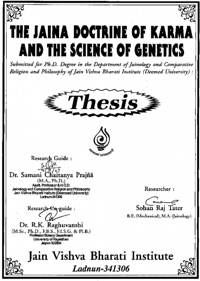The law which regulates the action of karma is based upon the principle of cause and effect, so that the saying "As you sow, so you reap " presents the whole doctrine in a nutshell.
Every action whether mental or physical is a sowing of the "seed" or in the technical language of the Hindu Philosophy the engendering of karma. In the act of sowing the seed or engendering the karma, the soul has the choice of acting or retaining from action, but once the seed is sown or karma engendered, its freedom is replaced by on inevitable liability to bear its consequences. This is what constitutes the bondage of the soul. karma, therefore, is a kind of force which compels the soul to bear the consequences of its right and wrong actions, and this force originates in the very action itself which is performed by the soul and at the very moment of its performance. [80]
The term karma means activity/actions by the living being mental, vocal or physical. If there is no activity, there is no life. Many actions are deluding, selfish or with attachment, while many are otherwise. The karma theory promotes the Gītā sermon of non attachment, non delusion, non-selfishness and desirelessness for the happy worldly life. It promotes self elevation along with public elevation morally and physically.
In general, the karma theory aims at individual spiritual upliftment. It is just unfortunate that this spiritualism has taken us too far to become self centered, egoistic and selfish. The individualism or spiritualism became an isolated system. The isolationism has its good and bad effect for the society. It is interconnected and interrelated system with environment and other entities each effecting one another. Thus, the scope of karma theory has gone very wide to include group karmas, national or international karmas. This has improved the utility of karma theory for spreading universal brotherhood and increasing the overall happiness in the world. It has a potency of making the world more peaceful and as well as physically progressive.[81]
 Prof. Dr. Sohan Raj Tater
Prof. Dr. Sohan Raj Tater
 Doctoral Thesis, JVBU
Doctoral Thesis, JVBU